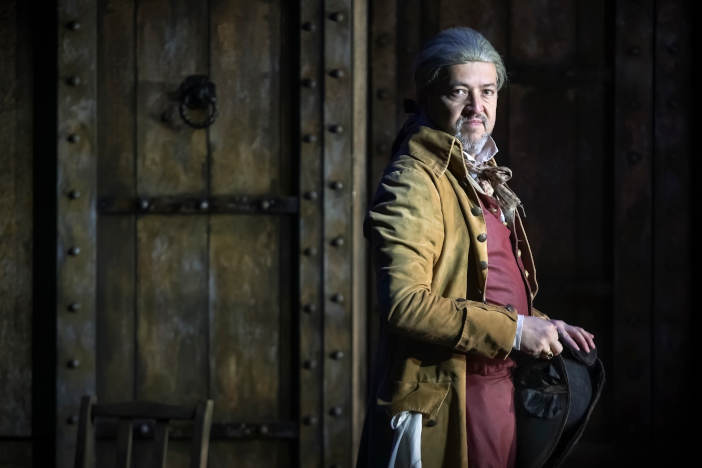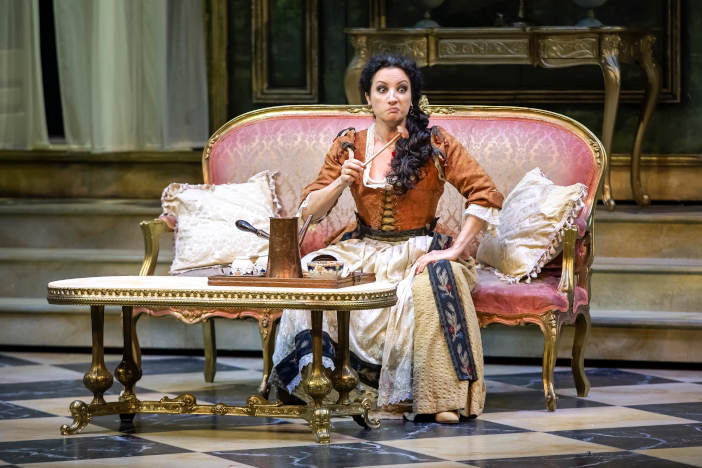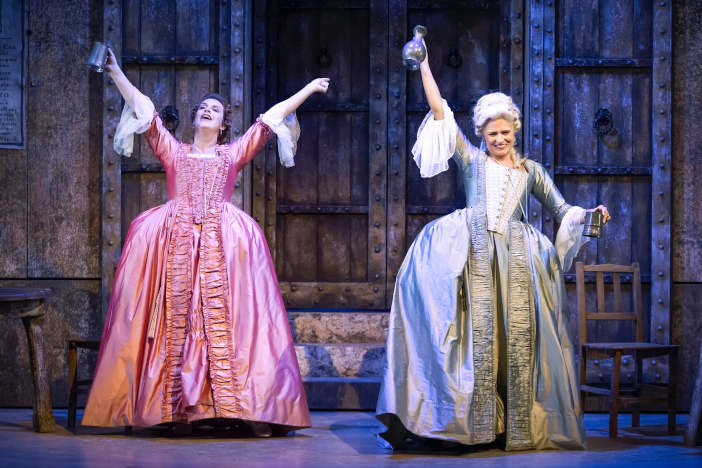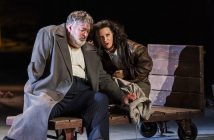The beloved comic opera, Così fan tutte (meaning ‘Women all do thus’) premiered in 1790 and went on to become one of Mozart’s most performed works, and it would have been just as well received by the composer’s own patrons had they witnessed this year’s Grange Festival opening production directed by Martin Lloyd-Evans. Sung in the original Italian, the traditional staging will appeal to Mozart devotees, set during the time of its composition, with all the action taking place in Naples as specified in the libretto by Lorenzo da Ponte.
The last of Mozart’s three operas with librettist Ponte, following on from The Marriage of Figaro (1786) and Don Giovanni (1787), we first meet the cast during the Overture and a bustling street scene where excursions to Vesuvius are advertised, tourists (including the key players of the tale) are plied with wares and tacky souvenirs or entertained with magicians and the like, while the revolving set design by Dick Bird makes transitions an effortless affair and provides the audience with background interest throughout, from elegant drawing rooms with ornate interiors and twin balconies to seedy taverns where we’re given a sense of the two sides of Neapolitan life in the 18th century, a sense reinforced by the vigorous Grange Festival Chorus whose first act procession around the auditorium heightens the sense of jocularity.

Underpinning this beautifully choreographed production, Kirill Karabits conducts the Bournemouth Symphony Orchestra with his usual masterful touch, drawing out all the nuances of the score, while the strong partnership between Bird and Lloyd-Evans, who previously collaborated on the 2017 Grange Festival adaptation of Jane Austen’s Mansfield Park, undoubtedly lent this quick-witted reimagining of Così a cohesion which lent believability to this most far-fetched of plots. Far from shying away from the ludicrous, Lloyd-Evans has taken the sexual double standards behind this comic opera masterpiece into a relatable fable for contemporary audiences to mull over.
The cynical Don Alfonso (Christian Senn) claiming to be more worldly wise than soldiers Ferrando (Associate of The Mozartists Alessandro Fisher) and Guglielmo (Australian baritone Nicholas Lester), is adamant that all women are alike in their fickleness of heart, denouncing the naivety of the men and urges them to test the loyalty of their fiancées, sisters Fiordiligi (Samantha Clarke) and Dorabella (Mezzo Soprano Kitty Whatley), by playing a trick on them that will reveal the truth once and for all. Ferrando and Guglielmo are so certain of their brides-to-be and their own appeal that they happily accept Don Alfonso’s bet and agree to any terms. The Chilean-born baritone Senn is a suitably wily Don Alfonso who delights in telling the women that the soldiers have been called up by Royal Command, having instructed the men to later present themselves to the ladies disguised as rich and ardent new suitors eager to claim the affections of the two farcically unsuspecting and grief-stricken women.

Despina (Carolina Lippo), Fiordiligi and Dorabella’s canny maid, surprised to see the sisters bewailing their lovers’ absence, is taken into the confidence of Don Alfonso and, promised a reward if she can help him carry off his plan, happily encourages the sisters to have fun with other suitors before their future spouses return from battle and shackle them to marriage vows. After all, Despina shrugs, it’s only what men would do in the same situation. Clarke and Whatley (also Dorabella at Opera Holland Park) were the melodic force of the night, displaying their violent and changeable passions as masterfully as Mozart intended, while Whateley more than held her own against Clarke’s impressively resonant vocals.
The Grange Festival’s audiences are able to take full advantage of the intimacy afforded by experiencing Così in the custom-built theatre belonging to the Grade-I listed neoclassical mansion as opposed to one of the larger international opera houses, while enabling the singers the benefit of seeming to personally address opera-goers, not least Australian/British soprano Clarke whose ‘Come scoglio’ was nothing short of electrifying as she begs us to witness her unshakeable fidelity, something we’re bound to smile at and recall the Shakespeare trueism, “The lady doth protest too much, methinks”!

Lippo’s ‘Una donna a quindici anni’ (meaning ‘a young woman should know how the world works’) was suitably buoyant after the 100-minute dining interval, while the synergy and harmonies between Lester and Fisher rivalled their female counterparts to offer a deliciously engaging second half as the sisters play into Don Alfonso and Despina’s hands after succumbing to intoxication at the tavern – perhaps to enable us to better excuse them for future misdemeanours? Predictably, but no less amusingly given that both women now prefer their sister’s former partner, they each allow their new suitors to usurp their all-too-easily forgotten fiancés with the bodice-ripping abandon we have come to expect from heroines of the 18th century.
The Grange Festival Chorus make a welcome return in the lead-up to the finale, with Despina disguising herself as the notary of a pretend double marriage ceremony before the affairs of both couples are untangled to reach a happy conclusion, requiring the returning soldiers to examine their own consciences. This triumphant Così is a standout in a long line of productions I’ve been fortunate to enjoy over the years and a testament to The Grange Festival’s supreme talent for world-class casting. I’m yet to go away from the rolling hills of Hampshire with anything but a smile on my face after a production here, but this occasion prompted a Mozartian grin.
Così fan tutte The Grange Festival, The Grange, Northington, Alresford, Hampshire SO24 9TZ, on selected days until 24 June 2023. Production images by Craig Fuller. For more information and tickets please visit the website.
Photography by Craig Fuller.




